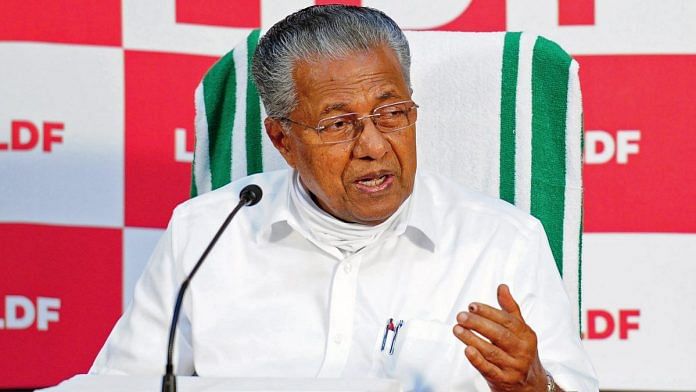Of all the wannabe Modis in Indian politics, this one must make the Prime Minister’s 56-inch chest swell with pride and satisfaction — a dyed-in-the-wool comrade from Kerala, Chief Minister Pinarayi Vijayan.
Though often dubbed as “dhoti-clad Modi” for what his critics believed was his autocratic style of functioning and intolerance to dissent, Vijayan has started copying Narendra Modi’s governance model in earnest only in his second innings as CM.
His first act after winning another term in Kerala last week — picking up his ministers and allocation of portfolios — had Modi’s imprint all over. The CM has entrusted himself with the charge of “all important policy matters”, apart from 27 departments.
This means that no minister in the Kerala government would be able to take any policy decision without the approval of the CM. All ministers in Kerala will effectively be puppets, with Vijayan pulling the strings. It’s straight out of PM Modi’s playbook.
Also read: KK Shailaja, Kerala’s ‘virus slayer’, dropped from cabinet as CM Vijayan opts for new faces
The ‘Modi model’
After assuming office in 2014, Modi had done the same thing, taking charge of “all important policy issues”, apart from other portfolios. It dawned on his ministers soon that they were mere puppets with a symbolic role in policymaking, if at all.
In another move, the Vijayan-controlled Communist Party of India (Marxist) secretariat has decided that private secretaries of the ministers would be nominated by the party. It was similar to what had happened after the Modi government took over in 2014. It issued guidelines that any officer, official or private person, who had worked as personal staff (PS) of a minister in the previous United Progressive Alliance (UPA) government wouldn’t be appointed for the same role in the NDA government. The reason cited was: “Due to administrative requirements.”
It was so strict that even Rajnath Singh, then home minister, couldn’t have a PS of his own choice — an IPS officer from the Uttar Pradesh cadre who had served as PS to a UPA minister — despite personally taking it up with the PMO. As it is, while bureaucrats who have to serve as PS of Modi’s ministers are closely vetted, most others, including officers on special duty (OSDs), are drawn from Rashtriya Swayamsevak Sangh (RSS) or affiliated organisations, especially its students’ wing — the Akhil Bharatiya Vidyarthi Parishad (ABVP).
Pinarayi Vijayan has now got the CPI(M) to adopt this model in his government. The idea is simple: to watch over the ministers through their personal staff. In fact, a couple of years after this model had come into place in New Delhi, Vijayan seemed to have gotten drawn to the idea of having control over the personal staff of ministers. In December 2016, he had convened a meeting of these staff, which caused much heartburn among ministers.
Five years later, the CM has got the party to take away the ministers’ discretion in choosing their private secretaries.
Also read: Kerala’s Deng Xiaoping, Pinarayi Vijayan is showing Bengal’s Left how it’s done
Emulating Modi
It may be too early to say how far the Vijayan government would go in emulating the Modi model of governance in his second innings. Many in political circles are already drawing a parallel between the two, given how the Kerala CM dealt with his rivals and potential challengers in the party.
After taking over as Kerala CM in 2016, Vijayan had virtually shunted his arch-rival and former CM V.S. Achuthanandan into a sort of margdarshak mandal, making him chairman of the administrative reforms commission and keeping him out of poll campaigns. With pre-poll surveys predicting a historic second consecutive term for the Left, Vijayan went about getting rid of potential challengers, denying party tickets to those who had had two consecutive terms as legislators; it resulted in five ministers’ removal from the poll race. After the elections, he got rid of the rest of his potential challengers, dropping all ministers from the previous government in the name of inducting ‘fresh blood’.
Many comrades in Kerala may not be surprised by the turn of events in the first week of Vijayan’s second innings. The most powerful Communist leader in India today, Vijayan was dubbed as “dhoti-clad Modi” by his detractors to denote his authoritarian style of functioning and the use of the government and the party apparatus to promote his personality cult.
He was also accused of turning Kerala into a sort of police state. There were allegations of fake encounter killings of Maoists, custodial deaths and torture, and apathy to political violence and murders. Months ahead of the 2021 assembly election, he brought a controversial amendment to the Kerala Police Act, which was seen as an attempt to curb free speech in the garb of preventing social media abuse. The government later withdrew the amendment following much criticism.
In an interview to ThePrint in the run-up to the assembly polls, this is how Vijayan responded to his description as Kerala’s Modi: “I do not know what kind of person Narendra Modi is. The people of Kerala know what kind of person I am for many years. I don’t now have to emulate Narendra Modi. I have my own style and methods. Modi might have his own style.”
Seven weeks after that interview, Vijayan seems to have found merits in that description as he starts his second term, emulating Modi.
Views are personal.



